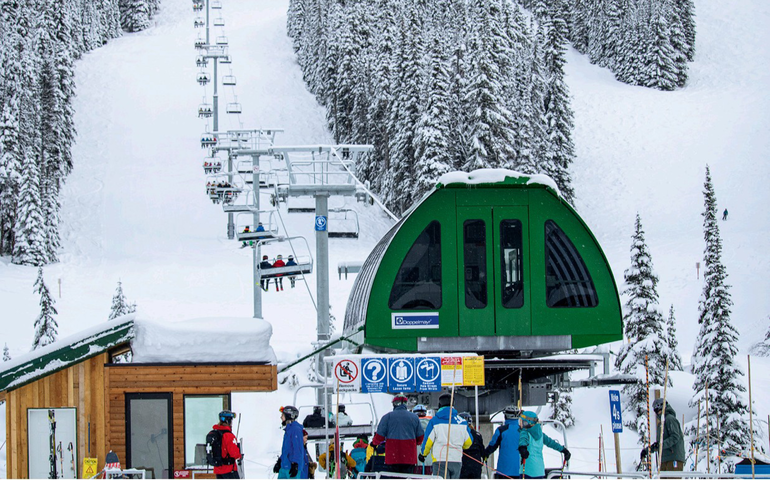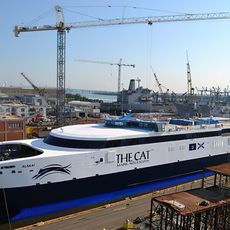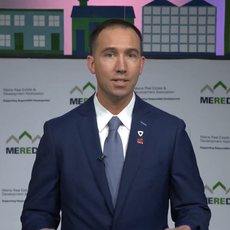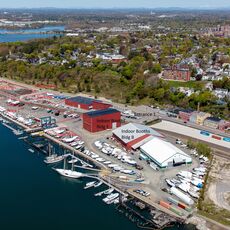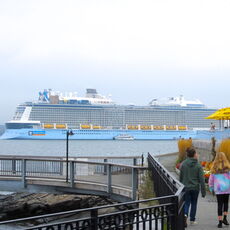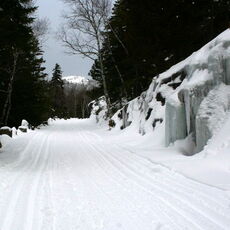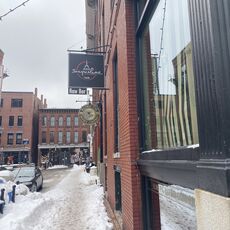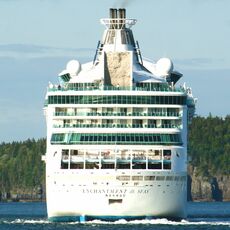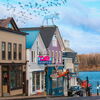Processing Your Payment
Please do not leave this page until complete. This can take a few moments.
Tourism & Recreation
Feds award $2.5M to BigRock Mountain for new chairlift
The existing lift is over 50 years old. The new lift will feature technology such as a touchscreen interface that eases system operations and maintenance.
-
Maine producers shine in 2021 Good Food Awards
February 5, 2021Seaweed salad made in Maine and one of the state's craft beers were among this year's winners, selected among more than 1,900 entries nationwide.
February 5, 2021California hospitality veteran takes reins at HospitalityMaine
February 3, 2021Matt Lewis comes to Maine with nearly two decades of San Francisco Bay-area hospitality and tourism experience, and now faces the challenge of rebuilding Maine's pandemic-decimated restaurant and lodging industry.
February 3, 2021For Maine's outdoor rec companies, last year offers useful lessons
February 3, 2021People turned from house slippers to snowshoes. “We’re building this industry one family and one person at a time,” said Adam Shepherd of the Portland outdoor adventure organization Rippleffect.
February 3, 2021Maine-Nova Scotia CAT ferry cancels another season
Updated: February 3, 2021Resumption of the high-speed passenger service between Bar Harbor and Nova Scotia was delayed by terminal construction in 2019. The pandemic forced the cancellation of service last season, and now the one that was planned to start in May.
Updated: February 3, 2021Mills lifts curfew on Maine nighttime business operations
January 29, 2021For two months, a public health measure has required restaurants, bars and movie theaters to close by 9 p.m. Encouraging new statistics have prompted Gov. Janet Mills to end the restriction.
January 29, 2021After outcry from businesses, Mills rethinks tax on PPP loans
January 28, 2021The Mills administration originally said it planned to tax businesses on PPP loans, saying the levy would generate $100 million in revenue. But after a backlash from chambers and trade groups, the state is reconsidering.
January 28, 2021Businesses balk at Mills’ proposal to tax PPP loans
January 26, 2021With many businesses struggling to survive the pandemic, the Maine State Chamber of Commerce and other groups are urging the Legislature and Gov. Janet Mills not to tax loan proceeds from the federal Paycheck Protection Program.
January 26, 2021MEREDA Forecast Conference: After challenging year, mixed prospects ahead
January 22, 2021Mainebiz has complete coverage of the annual industry gathering, held Thursday by the Maine Real Estate and Development Association. Our reporting starts with this roundup of highlights and observations from the virtual conference.
January 22, 2021York County's resilient hospitality industry readies for the next test: 2021
Updated: January 25, 2021Inns and other businesses that have thrived on Maine's southern coast for generations were hard pressed by the pandemic last season. The iconic establishments are hoping the lessons they learned then will prepare them for this year.
Updated: January 25, 2021In-person Portland boat show planned for July
January 19, 2021With nearly 17 acres of waterfront space available, organizers expect there will be plenty of room for exhibitors and visitors to spread out for the show, founded in 1987. The "pandemic pause" ruled out the original timeframe of March for this year'
January 19, 2021Naples inn, originally a ‘boarding house for young ladies,’ eyed as year-round opportunity
January 17, 2021The buyers moved from Reno, Nev., to buy the Lakeview Inn, after searching coast to coast. Neither had been to Maine before.
January 17, 2021Five factors that will determine extent of 2021 cruise ship season
January 14, 2021A CDC framework for the resumption of cruise ship operations is designed to mitigate the risk of COVID-19 outbreaks on ships and prevent passengers and crew from seeding outbreaks at ports. CruiseMaine is working with communities and Maine CDC to
January 14, 2021Park performance, part 2: With fewer out-of-staters, Acadia sees decline in visits
January 12, 2021According to the National Park Service, visitation declined 22%, from 3.4 million in 2019 to 2.6 million in 2020.
January 12, 2021State parks shattered attendance records in 2020 despite closures, limits
Updated: January 12, 2021Maine's 53 state parks and historic sites topped 3 million visitors for the first time in history, despite the fact that 10 popular coastal parks were closed in April and May.
Updated: January 12, 2021Maine eateries face 'hard winter' despite customer support, survey shows
Updated: January 11, 2021Out of 2,000 regular customers surveyed by Eat Drink Lucky newsletter and the organizers of Maine Restaurant Week, the vast majority said they have not resumed dining inside restaurants.
Updated: January 11, 2021In Bar Harbor, cruise ship debate raises questions around town’s identity
Updated: January 8, 2021The impact of cruise ships is the topic of ongoing discussion among Bar Harbor residents, who in 2020 glimpsed life without them. Town councilors this week debated whether to let seasonal residents and nonresidents weigh in.
Updated: January 8, 2021
